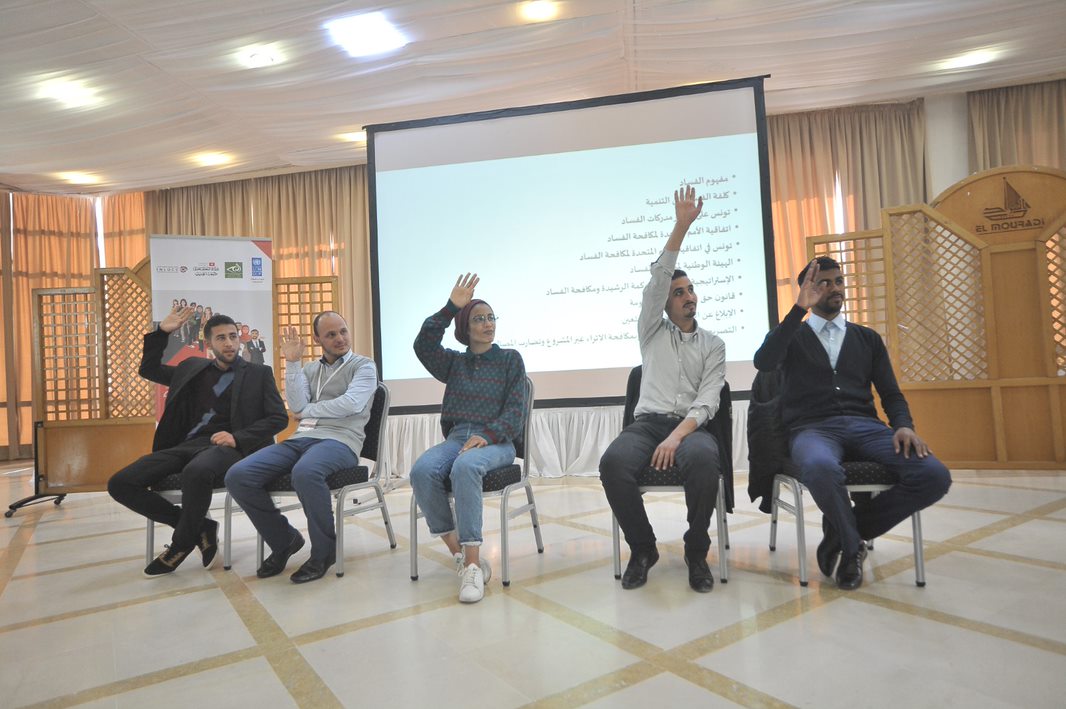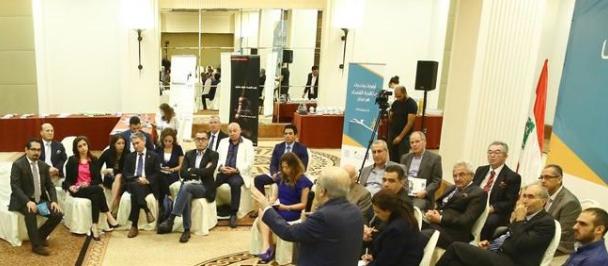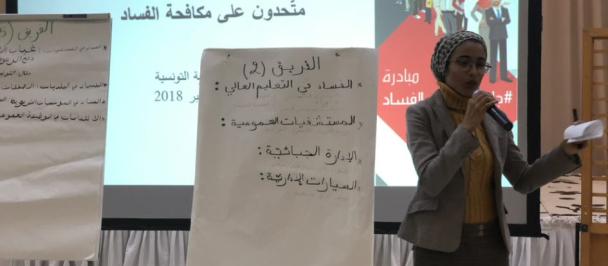Breaking an important barrier of silence in Arab countries
Change does not happen overnight. It requires time, perseverance, innovation and partnerships. This is what drives UNDP’s work in Arab countries, which has been instrumental in breaking one of the strongest “barriers of silence” in the region over the past years, around what was earlier a taboo issue: corruption.
Corruption costs 5% of the global Gross Domestic Product (GDP) and can eat up to 17% of a country’s GDP. The latest estimates for the Arab region put its cost at USD90 billion a year. Beyond numbers, corruption adversely affects every aspect of sustainable development and threatens peoples’ sense of dignity and security. This can be seen in lives wasted because a life-saving medicine was embezzled in a public hospital; or in futures lost because funding allocated to build a school was diverted to the pockets of a politician, leaving hundreds of children without education.
For long, leaders in the Arab region not only failed to tackle corruption but even to acknowledge its existence. Different attempts to change this situation faced clear manifestations of this denial. A first breakthrough came with the adoption of the UN Convention Against Corruption (UNCAC), which entered into force in 2005. UNDP took that as an opportunity to ride the wave and introduced an innovative and more comprehensive approach geared towards building trust, changing mindsets and promoting collective action on specifically targeted priorities.
Five years later, UNDP launched the first full-fledged regional initiative on this sensitive and critical topic –the “Anti-Corruption and Integrity in Arab Countries” (ACIAC) – only two months before the eruption of the fateful mass protests of 2011, which had corruption front and center on the list of public grievances.
ACIAC takes pride in many successes that it has achieved since then, helping to shift the issue of corruption from a taboo that is avoided in government discourse to a top priority that is clearly articulated by heads of governments and increasingly reflected in national agendas.
For instance, the Head of Government in Tunisia, Youssef Chahed, stated in 2017, in the aftermath of an unprecedented crackdown on corruption: “the Government will fight its battle against corruption till the end, assuming its responsibilities” adding “in the war on corruption, there are no options, it is either we choose corruption, or we choose Tunisia”. There are many other examples of similar statements in the last three years, as efforts continue to translate them into visible results on the ground.
“Corruption and terrorism are two sides of the same coin … and every effort must be made to tackle it from its roots.”
Iraq’s former Prime Minister Haider Al-Abadi. Opening 6th Ministerial Conference of ACINET Baghdad, April 2018
So, what was this new approach that UNDP is adopting in the Arab states region? And what results did it bring about so far?
Important starting point: national strategies and specialized laws
Showing that governments are leading by example and willing to make a change nurtures hope among people and motivates them to follow. To this end, ACIAC supported rigorous participatory processes that enabled governments to design national strategies and specialized laws that promote integrity, transparency and accountability.
For instance, Lebanon and Kuwait were enabled by ACIAC to develop their first ever national anti-corruption strategies in 2018; whereas five Arab countries translated ten out of twenty legislative reform proposals, supported by ACIAC, into law.. Morocco, and Lebanon adopted laws that facilitate greater citizens’ access to information about government decisions and use of resources—Iraq and Kuwait are on track to enact similar legislations; Jordan and Lebanon passed important reforms to protect those who report possible corruption cases; and Tunisia adopted a new law in 2018, requiring public officials to declare their assets, subjecting declarations to verification and scrutiny, and helping to expose unexplained wealth--a similar law may soon see the light of day in Lebanon.
Such strategies and laws help cement political will, through the institutionalization of anti-corruption beyond promises. They also create momentum that provides pressure and demand for further actions, including the actual implementation of the strategies and laws developed. In that vein, ACIAC has trained and continues to support more than 420 public officials and non-governmental representatives.
“The support of ACIAC has been indispensable for the progress achieved on the legislative agenda in our country. I look forward to replicating this approach in other areas of my work.” Ghassan Moukheiber, Lebanon. Former Member of Parliament. Human Rights & Anti-Corruption activist.
Prioritizing prevention: re-engineering processes in at-risk sectors
A key feature of the work of ACIAC is the focus on prevention in sectors that are vulnerable to corruption(e.g. health, customs and justice). ACIAC developed a unique methodology, with accompanying tools to identify corruption risks at key decision points along specific processes in such sectors and to reduce those risks. In doing so, ACIAC takes a more cumbersome but more fruitful road of ensuring that risks are managed by trained stakeholders, integrated in government functions and institutionalized through country platforms that bring together anti-corruption officials, sectoral practitioners and, whenever possible, civil society activists.
Having started only in 2017, this work has already recorded successes in Tunisia, Iraq and Morocco, is currently ongoing in Egypt, Libya and Palestine and is about to start, in 2019, in other Arab countries such as Lebanon and Saudi Arabia, in partnership with UNDP.
One example of success comes from the customs sector in Iraq. Triggered by his direct will, ACIAC helped set up and train a unit at the Prime Minister’s Office to identify and tackle specific risks in this sector. The unit instituted a mechanism to expedite customs clearance for perishable goods and discourage extorsion at the border. This led to the collection of more than USD250 million in additional revenues, in less than one year. This success has galvanized a firm commitment to extend the same approach to other areas of customs management and border control.
“For the first, we are directly addressing corruption in the health sector. The new approach creates a scientific language that brings stakeholders together to solve problems without antagonizing the organizations it is trying to reform.” Dr. Mohammad Mefteh, Tunisia. Senior Ministry of Health official
Work in the health sector has been equally fruitful. Tunisia sets the example in this domain. Collaborative efforts of anti-corruption experts and health practitioners helped re-engineer several processes at risk of corruption, including fair patient admissions and efficient dispensing of medicines. The Health Ministry estimated that these changes can save up to 13% of pharmaceutical resources in the three public hospitals in which they are being implemented.
Mobilizing stronger support: stakeholder networks and public engagement
Encouraging dialogue, exchange and collaboration between governments across Arab countries, and between government and other stakeholders in business and civil society can shift mindsets and fuel change. Since its establishment in 2008, with the support of UNDP, ACINET mobilized governmental and non-governmental entities to work together. Today, it includes 47 ministries from 18 countries, and a “Non-Governmental Group", which consists of 25 independent organizations from civil society, business and academia. Its members recognize it as the region’s leading participatory mechanism for capacity development, information exchange, and policy dialogue in the field. Similarly, resolutions of the UNCAC Conference of State Parties acknowledge ACINET as a key actor for training and education.
Investing in young people is also key to realizing a sustainable future. With the objective to mobilize youth to lead the promotion of transparency and accountability, ACIAC launched in 2016 “Universities against Corruption”, galvanizing 23 universities and over 2,000 students from Lebanon, Jordan, Tunisia and Iraq. After a series of trainings and dialogues with politicians, activists and experts, these young people join forces to develop and execute ideas to prevent corruption and promote integrity in their countries.
“It is our civil duty to promote and maintain integrity, because integrity is the only guarantor of our freedom and democracy.” Angie & Ali, Lebanon. Designers of a project to encourage implementation of access to information law.
Over the past years the Arab region witnessed a significant leap forward against corruption. Much remains to be done. Laws and strategies need to be effectively implemented; many risks in key sectors still need to be identified and managed; the room for stronger civil society participation is significant; and so is the need to engage businesses in collective action for integrity. Yet, compared to less than a decade ago, there are now solid foundations to build on to keep pushing the anti-corruption and integrity agenda further in years to come, as an integral part of the struggle to achieve the 2030 Global Agenda for Sustainable Development.

 Locations
Locations


